By Anna Lanford, Sal Donzella, and Matt Geran
This blog entry is written from the perspective of an old woman who is witnessing the changes occurring in the Chinese healthcare system as modern medicine is taking over the traditional.
Back when I was a young girl, doctors in my town used traditional medicines that have been passed down for generations, such as herbs and acupuncture. Today, there are some doctors who still choose to use medical care based on Traditional Chinese Medicine, like in the past, and others choose to use a more modern method. I have even seen traditional treatments like acupuncture and homeopathy used alongside modern practices and medications. I have witnessed Traditional Chinese Medicine treat all kinds of illnesses: mental, physical, and emotional. The old ways work so well because they address the source of balance within the body, or qi. When the qi is unstable, we become sick, and traditional medicines can return our qi to normal. These long-established remedies can be individualized to fit each patient, and therefore make the treatment more effective. I have heard stories of people who have been cured of pain and had their urge to smoke cigarettes cease after receiving acupuncture sessions. There was even one miraculous story of the traditional working alongside modern treatments. A woman was able to undergo open-heart surgery with very little pain as a result of acupuncture that was used during the procedure. As much as I believe that the old way is the best way to treat the entire body, I can see there is no way to slow modern medicine from creeping into our society.
Even with these breakthroughs in modern treatment, many of us in the countryside struggle to have any access to healthcare. In the past, the Ministry of Health has tried to bring in private investors to help poorly performing public hospitals, but even with the change in ownership, the hospitals continued to reflect poor management. Places like Hong Kong, Japan, and Taiwan, as well as America, Southeast Asia, and Europe are looking to put investments into Chinese healthcare, but I don’t see how they could understand the traditions in medicine that we have used for our whole lives. I worry that they will try to replace hundreds of years of our heritage with machines and computers. I know that these foreigners would let us be able to have more access to modern medicines, but I worry that they will take away what is rooted in the past.
If you want to learn more about acupuncture check out this video about acupuncturists in Shanghai:
https://www.youtube.com/watch?v=7Pf5Habm3O8.
Related Blogs
Bibliography
Fontes, Mario, and Stephanie Pina. “Homeopathy and Chinese Medicine: Uniting Two Forms of Energetic Medicine.” Townsend Letter. February/March 2009. 79-82.
Skyes, Kathy. “The Science of Acupuncture.” Alternative Medicine Series. BBC 2006. Web. https://www.youtube.com/watch?v=41vm87qq1KU
Shobert, Benjamin, and Sandra Ward. “China’s Healthcare Reforms: Addressing Discontent while Creating a Consumer Economy.” The National Bureau of Asian Research, March 7, 2013.




